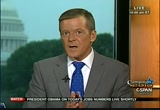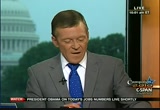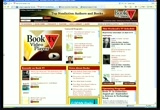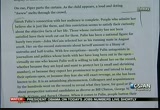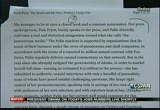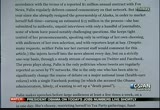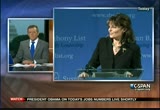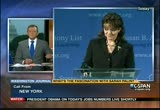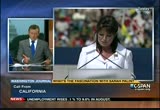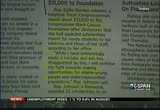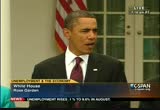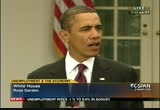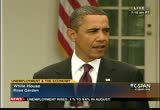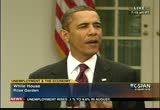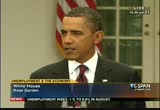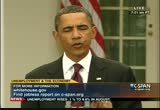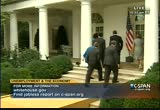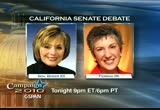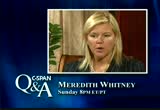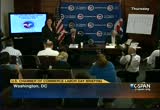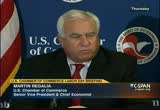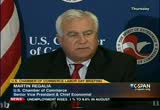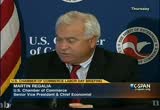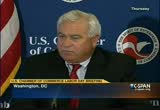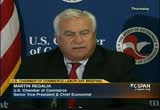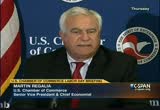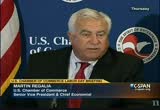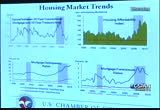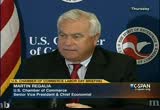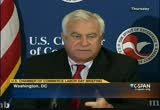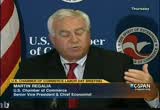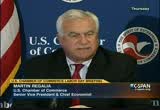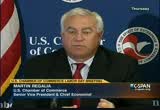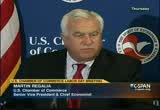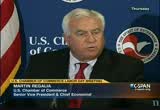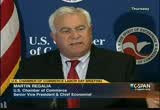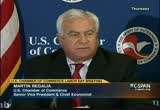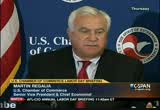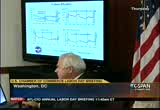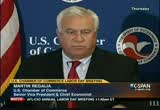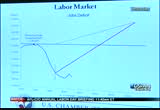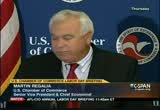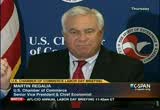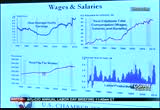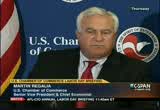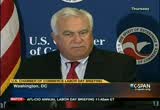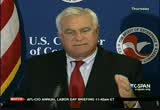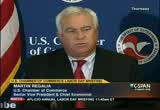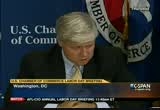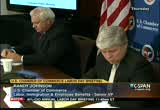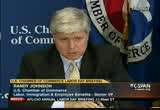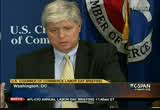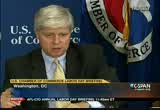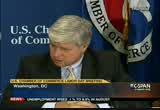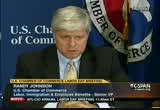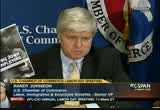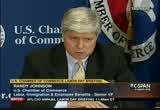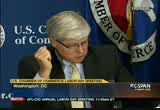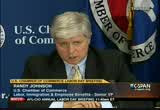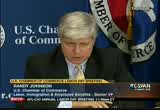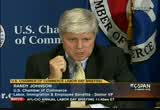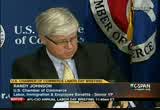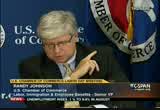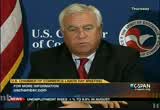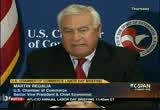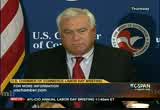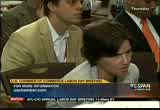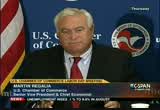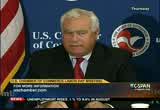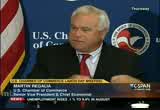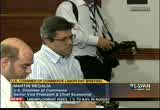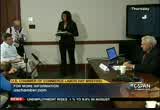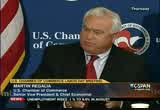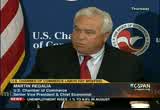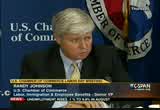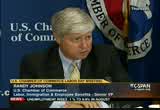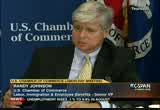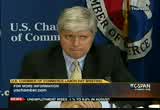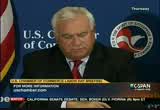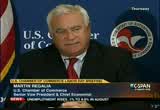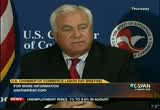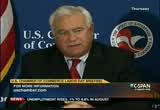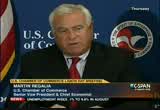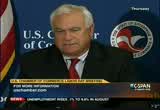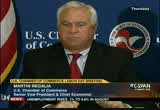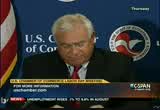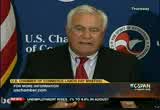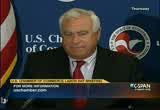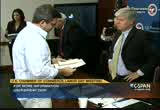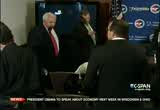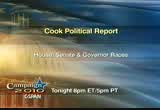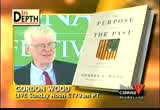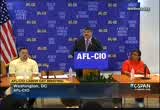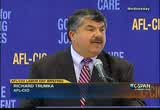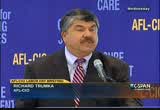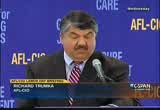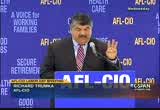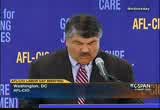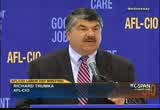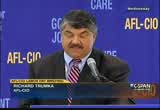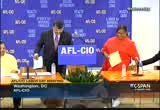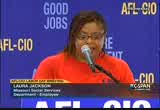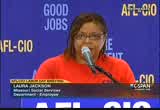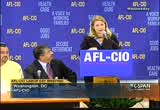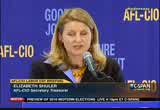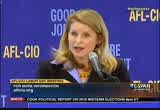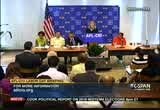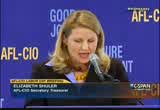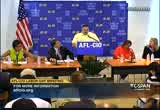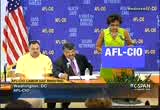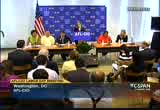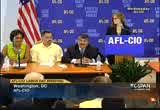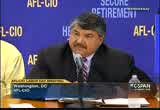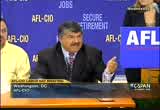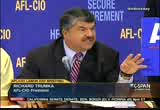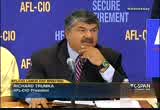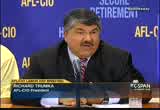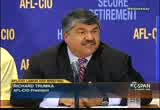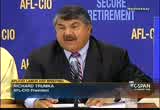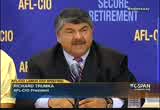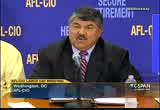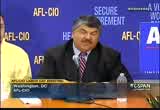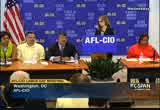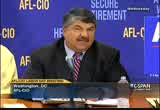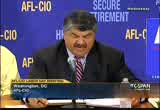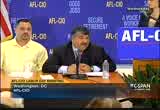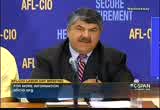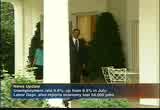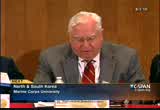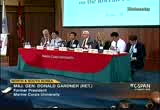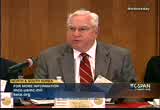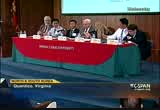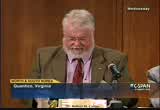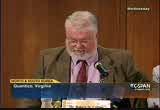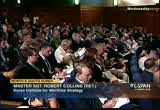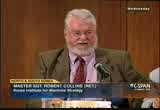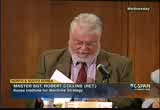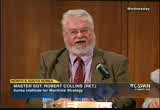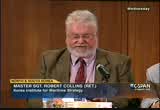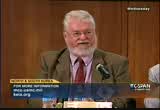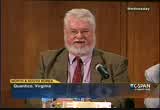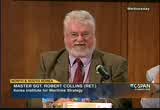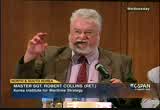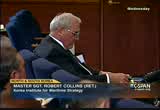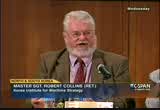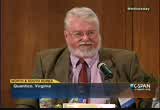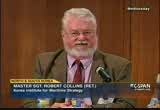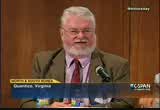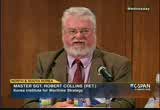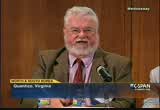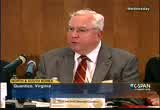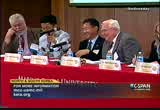tv U.S. House of Representatives CSPAN September 3, 2010 10:00am-1:00pm EDT
10:00 am
host: and here is a tweet . please explain the accuracy of opinion polling. opinion polling. guest: this is done across the country where they ask people to fill out a questionnaire indicating how they voted. the problem is that people assume that because of people fill these out that they would expect the results to be perfectly accurate, but that is not the case. we know from experience that if there tends to be a bit of a bias in who fills out those questionnaires and they are of it democratic until you weight them. until you weight them. you have to weight the response
10:01 am
to look at the different results. host: professor alan abramowitz is with emory university, political science professor there. what are you teaching this semester? guest: production to american politics and american elections and voting behavior. host: thank you for being with us. he is in town for the american political science association's annual meeting. in fact, c-span has been covering a lot of their events. tonight, if you have not gotten enough politics, tonight on c- span is the night to watch politics because we are going to kick off -- all day long this is going on. apm, the political report, there look at -- their look at the political races.
10:02 am
and we will look of the cook political report and the 2010 elections and their take on it. if i probably should have mentioned this first, at 4:15 p.m. this afternoon, american political science association 2010 elections. and then tonight, political report. then the california senate debate, which just happened last night between senator boxer and carly fiorina. and then the arizona gov. debate. we will follow that, governor burqa against her opponent, attorney general terry goddard. and then at 11:00 p.m. tonight, the nevada gov. debate between brian stanozol and rory reid, the son of majority leader harry reid. that is all politics tonight. "book tv" coming up.
10:03 am
the we have a three-day weekend coming up because of labor day. if you get 24 + hours of "book if you get 24 + hours of "book tv" plus on sunday is live with gordon wood. he will be our guest noon to 3:00 p.m. on sunday. join us then. this program will be back on the air. the president is about to come out and talk about the unemployment numbers, which came out at 8:30 a.m. the unemployment rate went up to 9.6% from 9.5%. and the labor department said companies added a net total of 67,000 new jobs last month. the president is due to come out in the rose garden and talk about the unemployment numbers
10:04 am
10:05 am
to come out. meanwhile, we will show you the beginning of this morning's " "washington journal"" on c-span. >> if the cover story from vanity fair. sarah palin, the sound and the furey, 9000 words. she has become increasingly secretive -- that is the lead in that story. from the vanity fair article. people who admire her believe she is that way.
10:09 am
fascination with sarah palin. g1 to hear your opinions. caller: i understand the fascination with sarah palin because she is a fascinating woman. what i don't understand about america is her divisive way of stating things. she got a negative thing to say about everything. she makes things up as she goes. could you imagine her running a country of 300 million people? host: dorothy, do you watch when she talks, do you watch the news? >> i watch you every morning and i watch the news. i have seen her make comments. i don't understand her. i remember when rahm emanuel made a statement and called one of his constituents -- i am not
10:10 am
sure who, but said they were acting retarded. she was offended by that. he was not setting it to learn. we both have freedom of speech. she says negative things about people. she was ok with a lady calling black people "the n word". that was supposed to be freedom of speech. >> you think sarah palin was ok with that? >> glenn rahm emanuel said someone was acting retarded, did not like that. in a medical transcriptionist. doctors use it all the time. >> new york, john, independent mind, what is the fascination with sarah palin? caller: first-time caller. thanks for c-span. i think it has to do with something more cultural, a sense of entitlement.
10:11 am
she is photogenic besides that. she invites people who are new in politics and to think that they possess the kind of knowledge to make judgments and take part in political debates without knowing -- without understanding "coming to it in a more humble way and the learning more about the issues. that is essentially the way it is. host: leave geneva, wisconsin, tom on the republican line. caller: the article was not sourced through sarah palin. are you trying to generate ratings? are you going to do an article about any democrat? johnson in texas, the scholarship scandal.
10:12 am
10:14 am
this is michael j. gross writing in "vanity fair." what is the fascination? caller: i guess it is the feistiness. she is not an educated woman, always criticizing president obama, however, she could not raise her daughter without being an unwed mother. i have raised five girls and all graduated from college. where does this signal to a woman stands in life? host: republican, mansfield, ohio.
10:15 am
caller: i have listened to a lot of the comments. i wondered if this so-called writer [unintelligible] i have nothing against him, but he may have something in his background he might be not proud of. host: what is your fascination with sarah palin? caller: i think sometimes she gets it right. i have been called an educated voter, but i am very educated. -- i have been called an un educated voter. she speaks for people who not educated.
10:16 am
10:17 am
it went up from 9.5% up to 9.6%. now the president. >> good morning, everybody. as we head into labor day weekend, i know many people are concerned about what the future holds for themselves and their families and for the economy. as i have said from the start, there is no quick fix to the worst recession we have experienced since the great depression. the truth is it took years to create our current economic problems and it will take more time than any of us would like to repair the damage. millions of our neighbors are living with that painfully everyday. i want all americans to remind themselves there are better days ahead. even after this economic crisis, our markets remain the most dynamic in the world. our workers are still the most
10:18 am
productive. bee remain the global leader in innovation, discovery, an entrepreneur ships -- we remain. we're losing 750,000 jobs a month when i took office. new figures showed the economy produced 67,000 private-sector jobs in august. the eighth consecutive month of private job growth. additionally, the numbers in july were revised upward to 107 ,00. that is positive news. that reflects breaking the back of this recession, but it is not good enough. we have taken further steps to create jobs to keep the economy going, including extending tax cuts for the middle class and investing in the areas of the economy where the potential for job growth is greatest. in the weeks ahead i will discuss some of these ideas in detail.
10:19 am
one thing we have to do also right now, one thing we have a responsibility to do right now is to lift up our small businesses, which accounted for over 60% of job losses in the final months of last year. that is why i am calling on congress to make passing a small business jobs bill its first order of business later this month. this is why this is important, up until this past may, we were not only raising fees for entrepreneurs who took out as belongs, we were also encouraging more community banks to make loans to responsible business owners. these steps are part of the reason about 70,000 new small business administration loans have been approved since i took office. i think sarah up for the outstanding job she has been doing and the administrator of the asba.
10:20 am
we have been fighting to extend the loan enhancements. a bill that would more than double the amount some small- business owners are able to borrow to grow their companies. it will completely eliminate the capital gains taxes on key investments so the small business owners can buy new equipment and expand. it will celebrate $55 billion in tax cuts for businesses large and small that make job-creating investments in the next 14 months. keep in mind, it is paid for. we will not add one dime to the deficit. so, simply put, this piece of legislation is good for workers, good for small business people, good for our economy. yet republicans in the senate have blocked the bill. a needless delay that has left small business owners across this country to put off hiring and expanding and put off plans that will make our economy stronger.
10:21 am
i have repeated since i ran for office, there is no silver bullet that is going to solve all of our economic problems. there are certain steps that we know will make a meaningful difference for small businessmen and women. the primary drivers of job creation. there are certain measures we know will advance our recovery. the small business jobs bill is one of them. i am confident we can put partnership aside and be leaders the american people need us to be if we are willing to do what is best not for the next election but for the next generation. we are not only going to see if america's hard-working families and small businesses bounceback, but rebuild america's economy stronger than before. thank you very much. i will be addressing a broader package of ideas next week's.
10:22 am
we are confident that we are moving in the right direction, but we want to keep this recovery moving stronger and accelerate the job growth that is needed so desperately all across the country. >> [unintelligible] do you regret the administration decision to call the recovery --? >> i will have a press conference next week. we will biba to answer some specific questions -- we will be able to answer specific questions. the economy is moving in and a positive direction. jobs are being created. just not being created as fast as they need to, given what we experienced.
10:23 am
we will have to continue to work with republicans and democrats to have ideas that will frederick celebrate the job growth. i am confident if we can do that. the evidence we have seen this summer and over the last 18 months if indicate we are moving in the right direction. we just need it to speed up.
10:24 am
>> the c-span networks provide coverage of politics, public affairs, non-fiction books, and american history. all available on television, radio, online if, and on social media networking website. find are content any time through the c-span video library. if we have the digital bus local content vehicle, bringing resources to your community. the c-span network is available in more than 1 million homes, created by cable, provided as a public-service. >> the american political science association posted discussing this afternoon on the 2010 midterm elections. speakers include mr. goldberg from the national review and matthews altink from the
10:25 am
heritage foundation. live coverage starts at 4:15 on c-span 2. cook political report publisher charlie cook joined the senate editor and others to talk about the house and senate and gubernatorial races, beginning at 8:00 eastern. following that, the california senate race, the first debate between democratic incumbent barbara boxer if and republican candidate carly fiorina. at 10:00 eastern, the arizona gov. debate with republican gov. jan brewer, a democratic state attorney general terry goddard and two third-party candidates. >> tonight, "book tv primetime, books to the stars. a planetarium director describes his book.
10:26 am
and the importance of amateur astronomy from timothy ferris, tonight on c-span 2. >> there is nothing about finance that is like a rocket science. that is the frustrating thing for me when you think about ponzi schemes. the biggest ponzi scheme is telling someone who has worked really hard to earn money that they don't understand how that money will be invested. >> in 2007 as analyst with the first to predict major losses for citigroup, one of the laurel largest financial services companies. she's our guest on sunday night at 8:00 on "q&a." >> the u.s. chamber of commerce's annual labor day briefing. chief economists, senior vice president of labor and employee
10:27 am
benefits, discussing current economic and workplace issues for businesses. they spoke in washington at the u.s. chamber of commerce, one hour and 15 minutes. >> hello, everyone. welcome to the annual meeting. thanks for coming. i am the senior manager of communications. we are fortunate to have our chief economist with the chamber. ander randy johnston, a senior vice president of labor and employee benefits. >> thank you. thanks for being here this morning. i will starts everything off and give you a few brief remarks on the economy and then i am going to speak a little about the labor market at the end of the presentation. i think that the important facts
10:28 am
right now is that we are growing again. we began growing a year ago. we grew at 1.6% in the third quarter, then 5%, down 3.7%. then back down to 1.6% again. that average is about 3%, only equal to and just about our long run potential. when you don't grow above your long run potential, you do not create the kind of job growth that you need to employ individuals against that were displaced during the economic downturn. we were looking at significant job losses, almost 8 million, during the course of the downturn. we saw a number of people that kept looking for work treaty that quit looking for work because they were discouraged and were not counted in the statistic. 9.5 million people at the peak
10:29 am
that we're working part-time for economic reasons. it wanted to work full time but could not find full-time jobs. if we are going to employ those kinds of people again, we are going to have to create an economy that grows faster than its long run potential. you can look at this chart, coming out of the 1982 recession, coming out of the 1974-1975 recession, these were deep recessions, we grew rapidly. 6.5% coming out of the first one. 7.7% coming out of the recession in 1982. as a result, we employed people again very quickly, put people back to work in nine months in the first case, 12 months in the second case. the last three recessions, 1991, 2001, and in the most recent recession, we have not. it has taken 24 months in 1991.
10:30 am
almost 39 months in 2001. these are the so-called jobless recoveries. in the 2001, it was not until after the 2003 tax cuts that the economy started to grow above its long run potential and really started to put people back to work. i think the key for us in this environment is how are we doing relative to potential. in this chart to the unemployment rate, ddp rate is well below potential. the unemployment is hanging well above what our neighbor, the non- --the rate of unemployment. this is what people surveyed say that we have not come out of the recession. in many cases they feel we are still in the recession, because the biggest, most important factor for individuals is whether they have a job or not
10:31 am
and whether they are generating income. in this case, it is understandable why people are saying things are not working. there are couple of tables. we will hand these out afterwards. you may have it already, some of view. -- you. the consistent feature is that prior to 1991 we went into recession, they were generally steeper, they contain a significant job losses, but then coming out of those recessions, we came out much faster. something has happened in the last three. i don't think it is just political. some of these war under republicans and some under democrats. there is some structural change in the economy. in dealing with that, we have to what our policies more closely and take more aggressive policies to make sure that if we
10:32 am
generate the growth that we need and that is in excess of 3%. when we look at -- there's a lot of talk about the new normal, the new economy. as someone who's studied the old economy 30 years, i don't believe in a day new economy. an economy is apt to change. but it does not run on a light switch and changed. we have seen changes before. i think if we could get some of the normal factors moving in the right direction again, that we could see economic growth picking up above its potential, will likely have come to expect coming out of economic downturns. the biggest factor is still consumption, which is 70% of the economy, is what drives everything. if consumption has been anemic at best. their reasons are that income
10:33 am
growth, which tribes 65% of consumption, has been relatively slow over this economic cycle. the recovery cycle. wealth is still negative. we recovered five trillion of what we lost and then the stock market sell-off a little. we gave a little bit of that back. the two biggest portions of individual wealth is generally their stock portfolio and to a greater extent, housing. i don't see us getting back the wealth that we lost and putting everybody back on an equal footing until the housing market recovers. there are different ways to look at that. you can't talk about 3-balancing of consumer balance sheets. -- you can talk about that. it all comes down to they have lost wealth. until the housing market comes back, we will not see them
10:34 am
spending. when you look at the housing market, it is not like the old days when we would say, when will they start building again? today you have to look at the entire market and say not just when will they started building, but when will the value come back and prepare the wealth of the american consumer-- repair the wealth? then we will start to see the building. the housing market is pretty much still moribund. it was stunning for those of us hoping to see improvement in the market. not completely surprising, given that the initial investment incentives had expired. but still, these numbers should be improving by now and they are not. i think that if you looked at the lower panel on this chart and uc and the amount of delinquencies in the sub-prime
10:35 am
market and use the amount of foreclosures in the sub-prime markets, that there is still considerable inventory out there that has to be either foreclosed on or reabsorbed back into the main part of the market before we are going to see price stability and price appreciation. i think we are still looking at probably a year or more of dealing with a subpar housing market. it will be quite some time before this asset bubble has worked its way through the system. so the bad news -- the good news is we are growing again, the bad news is we have factors like this that will require quite some time to work through before we can move the economy's growth rate from below its potential to above its potential. the investment sector has been producing pretty well. investment in equipment and software has been strong. if you have to ask why?
10:36 am
why do businesses invest? for a variety of reasons. most importantly, to meet demand. so the day are able to provide the consumer with products they want when they want them at a price that they want. that is why you invest and upgrade. what i see happening now in the business community is a little different. it is more of an artificial stimulation of capital. businesses have cut employment dramatically in the downturn and that has helped to improve their profit picture. they have internal profits and much of those profits have been held in the form of cash. we have speakinspoken about the business is holding 1.8 trillion dollars. that was at the end of the first quarter. it is probably higher than that. 1.8 trillion dollars in cash. a more normal number would be up
10:37 am
to 1.2 trillion dollars. this is not a normal state for businesses. businesses do not earn on that cash assets. they don't use them for investments. it would like to invest those but they are not. the reason they are not is in large part because of the uncertainty they face. uncertainties in the basic economy over when the consumer will come back, when housing will stabilize, when they will start to see more customer demand, and political uncertainties over what is happening in terms of the policies of this administration and this congress. so until they see more certainlty in the policies and n the economic end of it, you're not going to see them come off those cash positions. in the meantime, no business like to hold excess cash. especially in an environment
10:38 am
where there corporate stocks can be at depressed levels. you're looking at a stock market with downward pressure and you look at a business with a lot of cash on hand and oftentimes that just oftentimes like food who is someone out there looking to acquire a business. so they want to burn some of that cash off, not wanting to increase productive capacity in an environment where there is not demand to warrant that, so they do the next best thing and put it into capitals g stock to adjust their cash position. there's a limit to that. the end point that you are trying to meet is to meet demand. if demand is not there, there is only a limited amount of time that you will continue to invest. without demand picking up, i do not see the investment numbers
10:39 am
of staying as strong as they have been over the next year. when consumption is weak and then investment becomes weak, overall economic growth is very hard to generate. if the trade sector is deteriorating because growth abroad is still coming in sedan starts. we have had a problem in western europe in the southern tier that slowed growth in the european union's own. it looks a little better now than it did a few months ago, but it is still suspect. elsewhere around the world, growth has been lackluster, at best. when you're looking at the meeting that kind of export demand, it is relatively soft. in the meantime, we have seen domestic purchases increase. we have seen oil prices increase a little. much of what we import from abroad is oil and petroleum. in terms of trade, and things
10:40 am
shifting against us. our dollar strengthened a little. demand abroad slacked off a little. as a result we are starting to see a little bit of a decline in the improvements we have seen in the trade sector. i think there's more of this to come. the dollar is behaving relatively stable now. we are not going to see growth abroad pick up overnight. central bankers around the world are concerned and try to come up with the right formula to generate more growth. everybody is laboring under the same mediocre, anemic growth that we are. with that happening, i don't see the trade sector providing a real blessing or a way out of our slow-growth economy. what does this mean both inflation will be relatively low. the bond markets have been concerned about deflationary. that is one of the reasons that when you look at the interest
10:41 am
rates today, you see virtually zero short-term rates and extremely low -- 2.5% on the 10-year loan. extremely low rates. this allows the federal government to carry its debt at a relatively low cash flow. not low in absolute sense. it does point out that down the road if those interest rates start to go back up, if we start to see inflation picking up down the road, as we expect it will, that it will be harder to service those debt levels. right now i don't see inflation as a problem. i don't see a deflationary environment. i see a dis-inflationary environment. that's for the foreseeable future. for the next year or 18 months or so. the interest-rate -- i mean, when we look at some of the situations in the financial sector, they are much improved
10:42 am
over this time last year or two years ago. they are still not back to normal in terms of lending volume. while the spreads are back, the volumes are not. the banks tell us the volumes are not there because the demand is not there. many small businesses say the supply is not there. they're not willing to make some along as they were willing to in the past. both of these are true. really something about the eye of the beholder and what side of the fence you are on. again, as long as the laws have been passed, such as the financial services reform bill, leaving ambiguities out there, everybody is going to worry about whether they are on the right side of the equation. are we doing what we are supposed to be doing? this was one of the reasons we are concerned over the recent lyndonville, the bill to provide capital to smaller banks to lend
10:43 am
to small businesses. we have not supported it. we have been a fairly neutral on it because it begs the question, will providing the bank's more capital result in more loans? the smaller banks have seen the big banks take capital from the federal government and the circumstances have not always been positive for the banking institutions, so they will be somewhat skeptical. they will also be skeptical about taking loans from the government and intern making loans to small businesses because they end up holding the risk. if they make a mistake, then what is the federal response going to be, taking federal money and wasting it on loans that did not do any good? providing more capital but sending -- the business administration took this to nabhan programme back from the banks and filed it under the federal government, saying we do not trust the bank
10:44 am
to make student loans. now they are taking those same banks and saying we are going to instruct you and give you the capital to make small-business loans. student loans are easier to make them small business loans. there's a different risk profile. the federal government is telling these community banks, we don't trust you to make to lawns, but we will enable you to make small-business loans, but then we are going to be looking over your shoulder. i don't think some of these programs will have the bank for the buck that they otherwise would. i will slip through the budget stuff because that cuts both ways. right now we have a budget problem, but it is a long-term budget problem. the deficits we have seen in the last couple years and we are likely to see next year are to a great extent the result of a very steep economic downturn. the budget problems that are
10:45 am
truly problematic for an economy such as ours in the long run is not what happened last year or this year or next, but what will happen in five years or 10 years and 15 years and 20 years. the problem with our current budget situation is our spending programs and revenue generating potential do not meet. in the out years, we see bigger and bigger deficits, structural deficits. not cyclical deficits. cyclical deficits occur and extinguished as the economy recovers. stocks will deficits do not. the problem that we see down the road is structural deficits. now to the labour market, that is where the recession really settled in. we lost over 8 million jobs. still down 7.5 million jobs. we have an unemployment base
10:46 am
that has been stuck and will lead to rise before it comes down again. reason is when the marginally attached workers start to look for work, they will suddenly be calculated and counted as unemployed workers. they will show up in the statistics again. if we see little improvement. part-time for economic reasons, that number is bouncing around. at some point that will start to decline. when we look at some of the initial claims numbers like the ones that came out today, they are elevated again. they were down 6000. the four-week moving average is at 480,000 or so. at this stage of the record, we would like to see that a lot lower. the duration is extraordinarily long. there have been recent studies. barrow wrote an op-ed in a newspaper recently about how the
10:47 am
administration policy to extend unemployment insurance may have inadvertently created an incentive for people to remain unemployed logger, that that might be part of the explanation for this. whether it is or not, there's no denying the fact that we are looking at an unemployment problem that is shifting from a cyclical problem to a structural problem. that is to say, when people stay unemployed two years, it is harder for them to re-enter the workforce. there is some skill attrition hand there's a greater problem matching up demand with supply in the workforce. all of these things will plague us down the road, if we don't begin to address them now. the only way to address them in the short run is to get the economy growing faster and get hiring back on track. we looked at this chart that shows how steep this particular cycle was in the employment
10:48 am
sector relative to some of the past ones. when you look at how long it took to get back to the normal in '91 and in 2001 and you look at where we are starting from today, which is significantly below where we were, it is even more imperative that the economy grow at a faster rate. we have a bigger hole to fill. i did simple calculations and i'm going to flip to those, to this one right here. suppose we start at the beginning of this year -- if we wanted to get back to our level of job growth that existed when the recession ended at the end of last summer, not a year ago, how many jobs would have to be created starting them in order
10:49 am
for us to get back to where we were, in five years? that is 60 months. in 1991 it to 24 months. in 1982 and 1974, it only took nine months and one year. how do we get back in five years? let's take a realistic target. the job growth we have experienced since the end of last summer is well below the line that we would need. in fact, if you look at this particular --it is this one. if you look at this particular chart, this one says let's start at the beginning of this year. let's not worry about the end of last year when we were still losing jobs. let's look at when we started creating jobs at the beginning of this year. how much do we have to grow? how fast? how many jobs do we have to
10:50 am
create every month in order to get back to employing all the people who lost their jobs and all the new entrants into the workforce? the new people and the people who lost their jobs? not looking at a part-time workers or the marginally-simple it workers. as you can see, we are still well below that line. we have to grow at 240,000 jobs a month in order to kenn backhaus in five years predict a in order to get back inside years. every month that you go 95 when you are supposed to go to hundred 4 -- when you are suppoo go 240 means you have to grow even faster in the out years. we have to make things grow more
10:51 am
quickly rather than letting it work on its own down the road. when we look at what happens in wages and salaries because of this, they have suffered as well. by virtually any measure, you'll get the real average hourly earnings, they jumped up because of a big decline in inflation. the nominal wage --when you look at total compensation, realpe pay per worker, a virtually flat. that is not what you want to see. you want to see real improvement there because real pay equates to a real standard of living improvement. the way you get those numbers up is to create more tightness in the labour market. when the labor markets are operating within a 10% slack in terms of unemployment and
10:52 am
almost 18% in terms of under employment, you'll not see wage pressure building and he will not see income growing. incomes are the primary drivers in consumption. it is also a killer. at some point you have to break into this and get the economy moving again. we look at what is happening in household incomes. they are down. we look at what is happening -- there's a number we used to measure are the rich getting richer and the poor getting poorer. you look at that coefficient for about 1992 but to about a thousand during the clinton era, it went up. we saw the inequality in the economy rise modestly. whereas with the bush tax cuts
10:53 am
-- the clinton tax increases lead to more inequality. the bush tax cuts, the 2001 and 2003 tax cuts actually saw a period where the inequality stayed about the same. this inequality trend goes all the way back through 1980's and before. this is not something that is policy-induced. but it is something that can be affected by policy. you should have seen the income inequality drop, butku it did n. finally, this shows a the dispersion of income and taxes. we have a progressive tax
10:54 am
system. the rich pay more than their fair share. they have about the top 1% control 22% of income, but they pay 42% of taxes and so on, right down through the income distribution. we have a progressive tax system. we don't think that making it more progressive is going to be conducive to growth, because the rich spend. everybody says the poor have a higher marginal propensity to consume. and that is true. but the middle and upper income distribution controls so much more of the income. even though they are spending relatively less, they are spending large amounts. you cannot drive a broad based economy like the u.s. economy just on the spending of the
10:55 am
middle and lower classes. if you are trying to generate broadbased consumption and you are trying to generate economic growth and try to get the economy improving at a greater rate than 3% and trying to get job creation going, you cannot wipe out part of the population and say i am not going to look at them, i am just going to tax them more and give it to the other group and they will spend more. because you will never come out whole on that. you will not generate more consumption and more growth that way. in addition, many of the people if that will be hit by tax increases of the 2001 and 2003 tax cuts were not extended. who are taxing the engine of job growth, the engine of economic growth.
10:56 am
the people that spent. that policy does not seem to make good sense at this time. i will stop there and send it over to randy >> . thanks, marty. i'll talk about the state of the union movement, a state of the american workforce all little. issues we are seeing coming down informant law and -- in -- we usually see rhetoric coming out of the union movement around labor day. i have seen this the last 10 years. criticizing overtly them for using words like "corporate trader" and "terrorist." in a rebuttal, employers are facing a tough time. we are still providing health
10:57 am
insurance, over 170 million americans with health insurance he. 88 million americans have contribution plans. millions of americans with benefit plans. i think my point is that there is a lot of unfortunate stuff going on in a tough economy, but employers are trying to do the best they can buy their workers. the statistics show that. last week i learned that there was a gallup poll that surprisingly found in august that 48% of workers pulled were completely satisfied at work and 39% were completely satisfied. that comes out to about 87%. only 8% were completely dissatisfied at the workplace. when the unions characterized
10:58 am
labor day as a day where we have to rein in the communities, it is useful to keep these kinds of data in context. with regard to the labor movement, i have a few comments. the traditional trend has been to drops. down to about 7.4% in the private sector. in the area of state and local government and the public sector generally, it has been steadily rising. this year we saw half of the union membership in this country works for the public sector, federal, state, or local governments. why do we care at the chamber? that's sort of brings to the floor the fact that the union movement will have a hard time ever moving away from bigger
10:59 am
government and bigger programs and more spending, because that is where the base of the union membership is. how is that spending going to be paid for? higher taxes on the private sector workers and private sector companies. putting the federal government aside, at the tambor we had a conference recently on underfunded state and local pensions and health care funding. we are familiar with california. and studies have shown a $1 trillion gap in funding for state and local governments, and pension funds. promises made in which they cannot meet. other studies showed $3 trillion for that same data. there has been some attention to this. when people see the clothes allegiance between the unions and government, what we see in this alarming trend in the state and local garment.
11:00 am
is that another area where our members are paying higher taxes. workers are not going to be immune from this. it is an area that has been under the rug for so long. deals have been worked out between government officials and the unions and now it is time to pay attention to it. we will follow this closely at the chamber and tried to educate more people about this problem. there was a situation in san diego where a pension plan was underfunded by $100 million. what do you do? city leaders worked out a deal with the union leaders is wheaton the pension pot-- tp sweeten the pension pot. instead of working out a deal that the taxpayers would be on a hook for, it went the other way.
11:01 am
when some leaders of the unions say we have a revenue problem, i think we can see this is where the trend will go in the union movement in terms of more taxes, more burdens. let me say that, the challenges weaker states in growing the economy, marty spoke about that. i was working on this for 10 years on capitol hill, six years with the the problem of labor. i have never seen a more aggressive movement to put more and more burdens on employers in the employment and labor area than i've ever seen before. that is what this booklet is all about, which is in your
11:02 am
materials. it is put up in three parts. what is going on at capitol hill, what is going on on the regulatory side, and what is going on at a sub-regulatory level? there's a basic trend, there is legislation that helps unions organize, legislation to increase the level of damages under existing laws, for example, the civil rights laws. an employer can be penalized per discriminatory allegation up to hundred thousand dollars in addition to lost back pay. that's a lot. there's a bill on the hill to promote that and make it unlimited punitive damages. as we move down the ladder, there's another set of areas which is quds provides for more paid family leave or let's increase the number of categories covered under the family medical leave act, if
11:03 am
let's improved protections under the plant-closing laws. we have the elimination of the ability of employers to use arbitration in these cases. below that we see sort of a stirring of the pot to encourage people to bring cases against employers with the eeoc, and probably be, or in the courts. that is what this booklet is about. -- or with the department of labor. it is not that we disagree with everything the administration is doing. a lot of details have to be fleshed out. we don't disagree with every piece of legislation on capitol hill. the chamber sometimes compromises, because we do step back and work out deals when we can't, which we did on the americans with disabilities act. try to work out a deal on age
11:04 am
11:05 am
11:06 am
shifting to health care, what can i say? we agree with the majority of the american public, which has come out in very recent polls. three polls recently came out where the majority of the american public said, the worst of law was repealed and they think it is basically a bad idea and they are concerned about job growth. we feel the same way here in the chamber. frankly, i think the whole debate was unfortunate, in that from my viewpoint, i testified twice on the hill on this issue and these -- the white house speech writers never knew what the legislation said on capitol hill and when the president was out there talking about how it would help control costs, it was never going to help control
11:07 am
costs. it is not about controlling costs. it is about providing health care for the uninsured, or whatever. but they did not, and i think it is time to make it clear that costs are going to go up under this legislation our members are going to bear the cost of some of that. lastly on immigration, you will notice on the pamphlet here we have immigration as part of the agenda coming down. we're working with the unions for comprehensive immigration reform. we are discussing a temporary worker program. hopefully in the next three months we will come to agreement on that and have something to the applicable senators in january and february. but there are a variety of areas that we are concerned about with this new administration. one is called the newfield memo.
11:08 am
it basically redefines how the definition of an employer and employee relationship. it disregards longstanding relationships for the purposes of the application. a lot of our main -- major members, companies you would represent cannot fly by night companies, a lot of these people need these high-tech positions that are held up in the bowels of the dhs and department of labour. there is one bill on the hill, for example, that would say, if you're a company and you lay off an employee in any part of the company, you are therefore prohibited from hiring anyone
11:09 am
with a particular be set. if you have a company intemperances go, but you play someone off in maryland, you cannot bring that person in. we are very concerned about that trend. again, a lot of the material is discussed in the pamphlet. i do want to mention on health reform -- and again, our time is short, but we do have a website of called healthreformin? .com. -- healthreformimpacts.com here is one small businessman, running. a small business that employs 28 people in the northeast. for several years i had a group
11:10 am
health plan through the largest provider of such plans in new jersey. legislation was passed to my insurance company changed its policies and as a result, we were dropped and cannot find any company that will cover my employees. whenever i, or might human resources -- or my human resources manager has these questions to get the same response. it is that health care bill that has everything screwed up. our rates will go up 34% in the next year. our rates had been stable or even have small reductions in previous years. obama is supposed to reduce costs to small businesses? if you have any doubt that we are pursuing these arguments for political purposes, this is what
11:11 am
we are hearing from our members. a half we had a conference two weeks ago and a lot of small- business men are extremely concerned about costs. particularly those who work on very small margins. lastly, i would just as bad as you look at this booklet, bear in mind the number of renovations and requirements that employers already have to comply with under existing law. by the way, in your booklet, these are not quite the same as the ones in your booklet. they never seem to loom -- they look at bills individually as opposed to the totality of the legislation. all of that leads to a tremendous amount of uncertainty, as employers decide, can i hire someone new? can i go above the 50 employee mandate in the health care bill?
11:12 am
what happens if i get sued by an employee under some new law? i will hold back before i decide to hire. that is the state of where we are, i think. with that, we'll open it up. >> it seems that a full repeal would be pretty much impossible. even if the republicans take both chambers in the fall. what is your desired outcome, resolution of the situation to get to a situation that is more fitting for your constituents? >> i think you are right. we are realists. obviously, we are heavily promoting a bill that would remove the so-called hot 1099 requirement, which requires businesses to file a form with the irs if they have a transaction of more than $600
11:13 am
with anyone in their business. we recently sent a letter of to deal signed by, coincidentally, the first 1099 businesses to repeal the part of the bill. frankly, most policy makers in the congress never knew that was in the legislation and were surprised to find that out. the following question would be, this whole health care bill is built on a deck of cards and when to start repealing this part or that part, does the whole thing fall apart? smarter people than you can answer that, we will work on various improvements and test the political waters and see what can be done to improve the bill at the margins. if that works, we will move further into the legislation. i agree, repeal is not likely to happen. >> a question from arnie.
11:14 am
i know the bush tax cuts extension is your number one priority, but can you talk about the benefits of a payroll tax holiday -- a payroll tax, holiday, or any other? can you tell us about policies that the chamber might support? >> there has been talk about a holiday and how that might be structured to, whether it is across the board payroll tax -- there have been some questions on a payroll tax holiday and there have been questions about whether it is across the board, employer, employee, exactly who qualifies for it. there has been a lot of hype about the so-called higher act. -- hire act. and given the short term tax rebate for hiring a worker that has been out of work for two months or more. the problem with that particular legislation is, one, it is not
11:15 am
focused at the margin. if you hire anybody that meet the minimum qualifications, you get a credit for it. it is not like you have to hire more than if you have laid off. you just have to hire. well, businesses hire and let people go every day. every month you see in the statistics a net figure that has huge growth underneath it. and providing incentive for an activity that would already take place gets to be very expensive and it does not generate marginally new activity. not only that, but i think they put a two-month lag in there and hire someone who was out of work for two months in order to prevent someone who was gaming the system by firing someone and hiring them right back again. but in doing the, you play
11:16 am
havoc with the proud -- productivity of the worker. when workers are laid off, you lay off your least productive first and then your next and your next and the last person you layoff is presumably the most productive person you have and you try to keep them honest. when you go to hire somebody back, if that person was laid off in the last two months, you cannot hire them back. you are talking about hiring people back that have someone more eroded skill sets -- somewhat more eroded skill sets that have not been back in the workplace as much as other people. it is worth it to look at the long-term profitability of the worker and not just the short- term tax gain. while the administration claims that many people have been hired through the credit, they did not say how many of those
11:17 am
people were going to be hired anyway. what is the cost of the marginal new worker? when you look at the overall statistics on job creation, it is hard to find where 5.5 million net new jobs have been created. there is obviously a lot of pain out of the policy -- paying out of the policy for jobs that would have been created anyway. the hire act is implemented through giving you a credit in your -- against your taxes. a broad based system would still give you the bank for the buck. how many workers would be hired under the program, or no program
11:18 am
at all? it would depend on how it was structured and who have applied to and how long it was there for. in the end, the only thing that will get businesses to hire in a permanent way is if we get the economy growing and they have to hire in order to meet demand. that is the bottom line. the bottom line is, they will hire to meet demand. they will meet demand and make a reasonable profit. when we get in a situation where the demand picks up and the demand is driving shortfalls, then i think we will start to see more hiring and the payroll tax credit will help in that regard, but only tangentially, because the payroll tax to the extent that it provides disposable income to a broader array of american citizens, should lead to more consumption
11:19 am
and toward more hiring. it really depends on how broad it was and how long it was in for and that sort of thing. >> [unintelligible] >> i am j. heflin what the hell. martin, should you -- -- with a the hill. margin, should they bring back the tax credits based? i think at this particular juncture, that is something that could be looked at. i do not think it has the same impact as it did before. but it really depends. the homebuyer credit that was put into place was a homebuyer credit for first-time home buyers only, and for first-time home buyers in a certain income class. and that was not a broad enough group to relieve bootstrapped
11:20 am
the housing market. -- to really bootstrap the housing market. what you saw it is that it appeared to be home buying that shifted from a future time frame into the current time frame. shifting time frames, does not really generate growth in that area. if you can rob from tomorrow and put it into today and jump-start the economy going so that you get some of the positive 6 uecker -- cyclical effects of the economy, then there is some type of credit. but in this case it was too small, applied to to few individuals. -- applied to too few individuals. it was extended through the end of april. we sought increasing sales numbers in the april -- we saw
11:21 am
increasing sales numbers in the april into may time frame. you could still qualify for the credit. as an as that time frame ran out, it we have seen a fairly significant decline in the home buyers -- in housing sales and the like. i do not think the credit worked to jump-start the economy. it worked to shift the expenditure timing, but it did not jumpstart overall expenditures. i do not think that anyone at this point is discussing a broad based homebuyer credit that would be out there for anybody that buys a home. when you have a huge overhang in housing and you have a huge problem in housing that was, in large part, created because of the subprime lending market, people got loans that never could service those loans. they bought them on the hope
11:22 am
that the market could continue to improve and if you got to a point where you could not meet your mortgage payments, you could always sell the house back into the market very quickly at an appreciated price. that is a pretty good world to live in. we are not in the world anymore. the people that have the wherewithal to buy homes, they are not the people that are worried in the subprime market. they are the people that are not. the credit did not extend to them. >> with that being -- would you do a credit for everyone? but the problem with credits is the timing. if you are going to pick a -- >> the problem with credit is the timing. if you are going to pick a two- year credit, many people will delay their purchase to see how things go. our home price is going to soften up? they have two years to wait, so they wait a little bit. then at the end of the two years uc a spurt of buying and then
11:23 am
after that, a bit of a trough. the only time credits structured in that way really seem to work is if you can pick the timing. in other words, if you can say, i really need to generate growth this year. the last time we saw a credit like that work was an investment credit that was extended under the 2001 and 2003 tax cuts where we told businesses if you invest up to point x, you will get the tax credits back. the reason it was put in there is because we felt that if we could shift expenditures for next year to this year, we would be able to jump-start the economy and develop enough momentum going forward. it was robbing peter to pay paul, but they felt if they could get all spending it would generate positively for the economy. i think it worked to a certain
11:24 am
extent. but there are people that criticize the program because they said the timing there was not right as well. and then again, some businesses that could not taken advantage of it said, we ought to extend it again. and everybody said the mother is a limit to the start of credits. -- everybody said there is a limit to these type of credits. i think it was an excellent concept behind it of the time, but i do not think it was executed well enough. it was offered to too few people. by think we would need a more broadbased one and kick it would depend on how much we know about the economy. >> in discussions about temporary workers, what exactly does the jabr want? an ideal situation, and -- what
11:25 am
exactly does the chamber want? an ideal situation, and would that be a standalone situation? >> no, it would not be a standalone. it would be part of and more comprehensive package. and of course, the more controversial parts would be sanctions. but we would prefer a market- based program where if an employer goes through a fairly rigorous process, not an unreasonable one, but a fairly rigorous process in which he or she is trying to recruit from the domestic workforce for a job and cannot find a domestic worker, they can recruit from abroad. there has to be some kind of on that program. ideally, market-based would mean no cap. what would that number vdacs -- what would that number beat?
11:26 am
we have seen that number down to date due to the state of the economy. when you drill down to the details, what exactly would an employer have to do to show that they achieved their recruitment? right now, they are in a mode of not wanting any temporary worker program, just a commission to study the whole idea. that is unacceptable to us, but that is what negotiations are all about. we certainly have in the past with the unions with the mccain /kennedy bill and prior versions of that. -- in your view on h1v's because in the past it has been much higher. >> in this economy because the
11:27 am
economy is down, or the cat has not been hit. -- the cap has not been hit. they have not reached it because in a down economy they do not need the workers and they are not recruiting them. what would be the ideal gauck? -- ideal cap? i do not know. in the past, when the economy was booming we were at the 198,000 level and they were all used up. i'm guessing somewhere between 150,000 to 200,000. >> i'm curious about what you see as your funding priorities as the congress comes back and if you could go gill that into your political program. >> our funding priorities on the
11:28 am
hill would be to ensure that the choice act is not enacted. we do have problems with the house that has now passed the house and the senate. it makes it marked the more difficult for an employer to defend his or her case. and george miller has a bill out of the house on ocean reform that we have significant problems with, again, because we think personal liabilities for supervisors, criminal liabilities for things they may not have any immediate notice of. we always try to prioritize and those kinds of things are at the top level. of course, given the nature of the beast on capitol hill right now, [unintelligible]
11:29 am
withieve, we're working the sum to achieve production -- working with some to achieve production. the house has passed it before and it was a major -- major battle with the unions. the idea of the bill would be to say, look, if you are a small guy and you prove your case, you get your costs paid. because otherwise, these companies get chewed up by well staffed lawyers through the of the part of labor. -- through the department of labour. they have no chance of survival. on the regulatory side, it is a concern to us because our only defense in that case if
11:30 am
regulation comes on and we do not like it is to go to court and prove it is arbitrary and capricious. that is a tough standard and it costs a lot of money to go to court. we will have to pick our battles carefully in that area. we see in the next two years the battles of moving from capitol hill to the regulatory agencies probably. >> i'm with cnn. to get back to the bush tax cuts and the expiration possibilities, president obama is looking at a $250,000 figure, which is saying they will not raise taxes on the middle class. republicans, however, may find it politically expedient -- expedient to let all of the tax cuts expire so they can point fingers at the democrats in an upcoming election.
11:31 am
is it possible that you might exceed the $215,000 let -- level rather than risk all of the tax cuts expired? >> our position has been that we support an extension of all the 2001 and 2003 tax cuts. and we believe in an economy that is as weak as the one we are living in now that raising taxes on any individuals, and certainly individuals that spend significant amounts of money as well as businesses that are successful businesses and are in a career position to hire and expand output is not something that should be done. when it gets into which ones we would accept or not, i'm not going to sit here and negotiate with myself in public, saying we
11:32 am
will open the bidding after and see what comes back. congress is more and more concerned with any negative impacts that derive from increased taxation after the beginning of the year. as a result, i think they are debating more and more whether they ought to suspend this decision until such time as they can discuss tax reform in the broader context, which might be beginning next year and going forward. certainly, the chamber, i think, would support a complete extension of the bush tax cuts and a down the road on more fundamental tax reform. i think there are better ways to tax the business community and to tax society that meet the
11:33 am
dual needs of generating revenue, while still promoting economic growth. it is not going to be a fun debate. we have had them before. i think is interesting from the recent reports that the president's economic recovery group, they did not come up with recommendations. they came up with options. virtually all of those options have been exited in the literature. it is really combining the new with the old and moving forward. by the four to having an open discussion about that. -- i look forward to having an open discussion about that. we want to see a full extension
11:34 am
of the 2001 and 2003 tax cuts at least for some realistic temporary timeframe. >> is there gridlock on all of this? >> i think there is great potential for gridlock. we have seen that in a lot of areas. i will tell you one thing, if you go back and you look at the chart in your pocket -- packaged at what happens to the deficit and you look at the clinton era and how we generated a budget surplus. we bent -- which generated a budget surplus during the clinton area because of gridlock. we had significant growth in those years, which is not due to any short-term policy. i do not know if there is an economist out there that will give you a shift in product to
11:35 am
be gross. we know very little about it and it is primarily a long-term phenomena. at the same time, if you look at the spending growth, it slowed in the early part of the '90s from about 11% per year down to about 4% in total. the answer in discretionary spending were - four years. -- and discretionary spending numbers were negative for many years. i think you would aspire to having an honest, bipartisan debate and some good laws being passed. but if the alternative is bad laws and laws that retard economic growth verses gridlock, i think most people and most unemployed americans would take the gridlock. >> i am brian winfield with
11:36 am
forbes. even though they are sitting on cash, why should we assume that if we extend tax cuts that the wealthy americans will start spending, especially when there is so much uncertainty? why would these folks spend if business is not spending? >> the flat side of the question, you are not talking about -- the flip side of that question, you are not talking about cutting taxes. you're talking about raising taxes. if you raise taxes and businesses are not spending now because of the uncertainty and the underlying economic uncertainty, the lack of demand. they are not spending because they do not have to fulfill an increase in demand. if you were to put relative weights on those i would say it is probably 60/40, 70/30 even. the overall economic weakness is
11:37 am
not creating demand that needs to be met by expanding your business and increase in hiring. in that environment, do you want to take the risk of raising taxes, not keeping them the same -- raising them. taking even more cash out of the businesses. if you are sitting here saying you run a business and you need a certain amount of cash and the government taxes a certain amount away from me, what is your response? to drop your shoulders and say, let's start spending? or would it be to say, now i've got to make that up. the question is, do you think it response to a tax increase is going to be more spending? i do not. i think the response would be even less spending. that is why we oppose tax increases in this environment.
11:38 am
>> last question. >> i'm with reuters. we you address the small business argument on the -- will you address this month as a starter on the bush tax cuts that even though their taxes might go up, there are people in law firms and other professions that people do not to believe in god as small business? >> you are asking me to argue with myself. -- believthere are people in las and other professions that typically you would not think of a small business? >> you are asking me to argue with myself. let's look at the theoretic and
11:39 am
try to come up with a theoretical approach. then let's put that the reddick approach in the context of the current environment -- put that theoretical approach in the context of the current environment. again, i said there is very weak demand, no momentum, uncertainty over that economic problem, as well as uncertainty over the political problem. at this particular point in importanthink it is not to put more weight on a struggling economy, and it is quite clear that ours is struggling. earlier this year, at the end of last year, there were a lot of people that said, here we go. it is going to be a v shape to recovery and we're boy to come out of this. there were some light myself that saw the glass more half empty and said we just cannot see it continuing.
11:40 am
we had a debatable stimulus program. and we supported the stimulus even though we did not like its compensation. we felt it was important to do something and to go along with something that was not as efficient as it could become law because it was necessary. we are saying we are starting to grow again and what needs to be done going forward? half of the aisle or the other half is arguing that there ought to be stimulus. on the one hand, you are arguing about passing additional stimulus and we should pay for it with additional burden. i cannot see the logic in that. one of the shortcomings and one of the major disagreements between the way we see the economy working and the way the
11:41 am
administration sees the economy working has to do with the synergies. we work with big business and small businesses. we know that many small businesses sell to big business. without the business growth and demand, there would be no demand for small businesses to meet. how there is a basic synergy. trying to rifle shot programs that will just as to this piece -- just stimulate this piece and so allowing it to demandte broader market divan is unachievable task. is the wrong way to look at it. the economy is interconnected and trying to stimulate one little piece and paying for it with a tax on another piece is not going to work. just hiring a certain individuals or just a certain
11:42 am
11:43 am
>> the labor department reported this morning that unemployment is up, even though more jobs were created last month. the federal agency says that is due to more people restarting efforts to find work. president obama goes on the road next week to talk about the economy. he said today he will outline new efforts to jump-start job growth. small-business jobs in particular. the president will take off labor day weekend on monday with remarks at the afl-cio labor fest in milwaukee. we will have live coverage at the afternoon event. the president will travel to cleveland, where he will also deliver remarks on the economy and he is planning a news conference on friday to answer questions about his economic proposals.
11:44 am
>> the american political science association hosts a discussion this afternoon of the 2010 midterm elections. speakers include jonah goldberg from the national review and matthew spaull in from the heritage foundation. that is live starting at 4:15 p.m. on c-span2 and more on the outlook of elections tonight as charlie cook joined senator, jennifer duffy and david wasserman. they talk about house, senate and gubernatorial races. that begins at 8:00 p.m. eastern. falling that at 9:00 p.m. eastern, the california senate race between incumbent barbara boxer and republican candidate carly fiorina.
11:45 am
>> tonight, "book tv" primetime looks to the stars. >> join our conversation on the american revolution, the making of the constitution and the importance of its historical study sunday with pulitzer prize winner gordon wood on "book tv's" in depth. that will begin at noon eastern on c-span2. >> now the annual labor briefing from the afl-cio. speakers include afl-cio
11:46 am
president richard trumka. this is about 50 minutes. >> first, we will go to remarks and then open it up for questions and answers. i would like to introduce afl- cio president richard trumka. >> good morning and thank you all for joining us. this is a defining labor day for working people and the kickoff to the final round of defining a set of elections. we will rebuild a fundamental economy the values of hard work and a strong middle-class or we will turn back to one that puts corporate interest before people. we will either move forward together with compassion and thoughtfulness to solve our problems or allow the forces of hate to exploit our economic frustration. it depends on the choices we
11:47 am
make as a nation and on the job that we do as a labor movement. i've just come off their road for the last six weeks and what i heard decisively is that people are looking for economic patriotism. patriotism has traditionally been defined by foreign affairs, but patriotism should begin in our own backyard, in our own communities. in this election, working people are looking for economic heroes, champions who will put themselves on the line to create a better future for our children. we're looking for leaders who will call out corporations that
11:48 am
shift our jobs overseas, leaders who will reject unfair trade deals, leaders who will fight for the middle class, economy, and put us on the path to make things in america again. this election is about economic patriots. and it is also about corporate traders. over the last three decades, corporations have made strategic decisions to choose short-term profits over people. as a result, they have hollowed out america. they export jobs instead of products. things will continue to get worse if we let them. last week, house republican leader john boehner outlined the republican plan, a plan that would move us right back to the bush-era corporate agenda that created the economic morass that we are still trying to escape.
11:49 am
his plan would privatize social security and cut its benefits. it will protect corporations that ship jobs overseas and cut taxes for the wealthiest americans. mott's is where we will go if we allow corporate agenda to set our priorities again. mots with a household name that for many years, was as american as you can get. last year it reported a net income of $555 million. they are trying to profit tear off the recession. they are demanding deep wage cuts. why? simply because they can.
11:50 am
other companies are cutting corners on safety, right along with living standards. and you saw that. even the wealthy owners of the nfl are willing to lock out their players in pursuit of even higher profit. and on the gulf coast, northrop grumman is closing a massive shipyard that will actually cost three times as many jobs as the oil spill because more of our ships for our own military will be made overseas. but working people have to just get by with jobs. perhaps the jetblue attendant flight attendant who captured our imagination will become a symbol of a new movement.
11:51 am
the question is, will people be lured by a cascade of campaign dollars and the false sense of the right been energized? that is why the labor movement is talking to all working families and union families about president obama's record for fighting for working families. he took office with america on the verge of a second great depression, and he averted the worst possible outcome. we are talking to voters in states across the country about the real choices on the november ballot. the records and positions of candidates in key races. this labor day weekend, union families will hold hundreds of events to keep our country on
11:52 am
the path forward. in ohio, union families are organizing a bus tour to highlight how bad trade deals and outsourcing have destroyed the economy. in chicago thousands of new members will rally for a better america. in other communities across the country, union families will hold picnics and marches all with the same if gold, to keep us on the right economic track. and this weekend, we will be running television and radio ads celebrating the working people who are the backbone of our nation because it is working people working together who have always moved our country forward. and quite frankly, that is exactly how we will do it again. now, our ads are not political. they are a reminder of who we are and the role of working people in building a stronger
11:53 am
america and will be reaching working people where they are on labor day weekend, on sports stations, during baseball games, nascar, and the opening weekend of college football at the pigskin classic. we would also like to show an ad today so you can get an idea of what we're talking about. >> we work to make r communities safer. >> work to give our kids in community life. >> america's workers, the backbone of our committees. making things, innovating, working together, that is how we have always worked -- moved our country forward and we will do it again today. the afl-cio, working together for a stronger america. happy labor day america.
11:54 am
>> [inaudible] [laughter] >> let me conclude by saying this. this election is a about a lot more than who comes to congress in january. it will continue to define who we are as a nation and whether we are a nation that respects workers and rewards work. this election is a choice and, quite frankly, it will be cited race by race. workers deciding which candidate is on their side. between candidates who will fight to create jobs and end the unfair trade deals, or candidates that say no to drugs or no to unemployment benefits -- that say no to jobs or no to unemployment benefits.
11:55 am
that is why our political program is unique, because the union is a trusted messenger that will reach 17 million working class voters. in total, we are engaged in a massive mobilization in 26 states and we will work on senate races, governors races, over 70 house races and when you include state legislatures, we will be involved in over 400 elections in this cycle. we have tens of thousands of volunteers across the country overave already talketopped and our work haswere al just begun. over the next two months we will talk to millions of workers at their work site, their homes, on
11:56 am
the phone, and through local and national mail. our grass roots political program is going to ensure that each individual race -- in each individual rates, our members have the information to know who is on their side and who is not. with that, i would like to introduce laura jackson, a cwa member. >> good morning. i'm excited to be here today. i'm here from missouri and as mr. trumka said, i am a member of the communication workers of america. my job literally changed my life. i started working for social services at age 28 and before that, i never really thought about adoption. working for agency where kids
11:57 am
are in really bad situations helped me to feel like i was doing my part to help those children in families that are not taking care of them. my work had emotional impact on me and made me concerned about children in foster care that have led me to adopt my son, who is 16 years old -- 16 months old. it made me realize how important it is for workers to have an advocate to speak with them, because employers have lawyers and other resources available to them. that altman they led me to get involved in the labor movement with -- ultimately led me to get involved in the labour movement with cwa. i have always been interested in politics, but it was not until the obama campaign that i became heavily involved. i saw the difference that can be made. i saw critical it is for all was
11:58 am
to be involved in politics. in missouri, we are involved in the coalition as well as the coffee party, the common-sense alternative to the tea party. it has been hard on my family over the last five or six years. there has not been enough money to cover everything and things seem to be getting more expensive. i am really not sure how folks living on unemployment are able to make it. it seems like it would not even be able to cover their basic needs. that is why this election is even more important than the last election. we will continue the progress that we made and elect candidates that workers on the forefront. the number-one issue is jobs and need to make sure that our candidates make that their top priority. i will do all i can to be sure that happens. i will put the message got to my family, fellow union members, and anyone else i will listen.
11:59 am
thank you, and next i would like to introduce afl and cio the secretary-treasurer, elizabeth schuler. >> hello, everyone. good morning again. it is good to see all of you. i would also like to thank laura for being here and former activism and her powerful story. you have heard gingrich talked already about the importance of the upcoming election and how the afl-cio is fighting for good jobs for all americans and you know the statistics, 15 million americans who want to work are still jobless. if you add those who are underemployed, we are up to 26 million people. those numbers are staggering. i think sometimes we are reporting it, reading it, and sometimes people almost become desensitized to it because it is so common now. i think everyone knows someone
12:00 pm
who is unemployed. it really is devastating. we see it and hear it from people all across the country. every day, they are struggling. i have heard it as i travel across the country, especially from young workers. we especially put a spotlightang workers are not only out of a job, but what is not being reported widely is their stock working temporary, part-time, or low-wage jobs. many are delaying milestones that other generations took for granted, like getting married, buying a home, having children, and this is because their stock working multiple jobs without benefits and living in their parents' basement. it is tougher and tougher for young people to make ends meet.
12:01 pm
that is the bad news. the good news is, this next generation is also very mission- focused. they are socially conscience -- conscious. they look up for each other, have a sense of community, and are set to determine their own destiny. the afl-cio will be there to give them the tools they need to lead us forward. over the last year, the afl-cio has made it a priority to create and implement a comprehensive, strategic young worker on reach program. round-table meetings we have conducted in five cities over last spring, we call them future forums, set the foundation for our long-term program. in june, we had over 400 young workers in washington attending our summit.
12:02 pm
and they took a leadership role and laid the groundwork for the program long term. the program's goal is to engage younger union members and attract young workers coming in general, to the labor movement. you will see them mobilize around specific issues in the 2010 the afl-cio political program. we are teaming up with our community affiliate's, everyone is familiar with working america, to organize a postcard campaign with young women. we are asking thousands of activists to write thousands of postcards to women voters in key states where they may not otherwise vote. it is a way to engage their political peers. working america has become the word -- most dynamic development
12:03 pm
in the labor movement since it was developed seven years ago. it is the best opportunity for people without a union on the job to become a part of the labor movement. canvassers speak to 30,000 people a week. they are going door-to-door in working-class neighborhoods. working america is also in the midst of a massive campaign to mobilize jobless voters. at job fairs, unemployment offices, they are talking to thousands of people about the stakes of the election and the importance of the lifting economic patriots, as richard put it. so this labor day, working people are coming together to fight for good jobs, health care, defending our right, and those who have been hit the hardest, young people, people of
12:04 pm
color, unemployed people, are the ones that we need to engage the most in this election to make a difference. i have the privilege now of introducing the next voice to the podium, and international member of painters, who is here all the way from ohio. trent? >> thank you and good morning. glad to be here to represent my co-workers and so many others that are not here, to tell their stories. i am from toledo, ohio, a married father with a 7-year-old daughter and a 4-year-old son. i am a member of the international union of painters and allied trades. i was raised in a union family. my dad is a retired chief metalworker, my brother a fireman, and my father in law
12:05 pm
works for jeep as a skilled tradesmen. in november of last year, the company to work for for 11 years went out of business because of the economy. this business was started in 1923 and had an 87-year history in ohio. i went to work for another company by business had been unsteady. if the contractor does not have worked, i do not work. this year, and i am on pace to make 1/3 of my earnings that i have made in past years. my wife works for an optical lab, and fortunately, she has a steady work. you never expect something as drastic as something we have been going through but we know lot of other people are going through worse. over the past few months, work has started to pick up, but i am fearful it will taper off again. my father instilled hard work
12:06 pm
and volunteerism in me. the big reason i am going door- to-door making phone calls, working to elect people to fix jobs to fix our economy. i watched my dad to for me, provide for me when i played sports. he had a great work ethic and rarely missed work. that is why we need to collect them right candidate in office, people who are looking to support guys like my dad, and not the super wealthy. we cannot afford to put people in office who will forget about the middle-class. that is why i am working for gov. ted strickland and lee fisher who is running for senate. i am not sure when we will do if things do not turn around and if we do not put the people it -- right people in office. that is why i am going to do everything possible to make a
12:07 pm
difference in this election. there is too much at stake. thank you. i would now like to introduce the afl-cio vice-president arlene holbaker. >> thank you, trent. your story is one that moves us all, your commitment to state in the fight for the middle-class. good morning to all of you. we have been talking about economic patriotism and working people are facing. what we know is working people are frustrated, yet, they are angry. that frustration and anger is being stoked by people, groups, corporations who are trying to distract working families from the truth. the truth is, the agenda that they advocate brought about our economic devastation and will
12:08 pm
deepen the economic inequality that is so dangerous to our society. americans are angry because they are losing their jobs and their homes. we have seen the foreclosure crisis twisted to shift the blame from corporate wrongdoing to the victims of joblessness and foreclosure. about a month ago, the afl-cio partnered with the atlanta community to hear a hearing on the foreclosure crisis facing so many in atlanta, georgia. it ranks eighth in the state in america -- in the states in the country facing foreclosure. as the chair of the hearing, i heard the stories of a single mother, widow, a senior citizen, and an underemployed father. these were people over their heads because corporate greed and wall street had made them jobless, and in some cases, were
12:09 pm
in subprime mortgages. it is folks like these who will benefit from a consumer protection agency headed by elizabeth warren. these are people frustrated and angry, so we are fighting back. the afl-cio is determined that the tea party and its corporate backers are not going to get the final word. the afl-cio is proud to be joining with a coalition of civil rights, religious, human rights, environmental, and other progressive organizations as part as one nation working together, a rally to be held in washington, d.c. and across the country on october 2. one nation working together will show america what a progressive economic vision looks like. we are joining together with people from all across america
12:10 pm
because we are determined to build an america defined by greater unity, with jobs, justice, and education for all. working people who want to build a middle-class economy are the majority. we are fueled by hope and not hate. we have the pride, power, and determination to keep our country, ourselves, and community moving to an economy that values hard work and jobs that can support a family. so on october 2, we will come together and rally in washington, and we expect and the thousands of union families to come as part of one nation working together. on october 2, working families will also be knocking on doors in 26 states with thousands of volunteers to talk about the
12:11 pm
choices working families face in this upcoming election. yes, alexian's make a difference. thank you. -- elections make a difference. thank you. >> thank you. we are now ready for the question and answer part of the conference. >> ladies and gentlemen, if you wish to ask a question, please press star. if you are using a speaker phone, please pick up and said before pressing the numbers. if you have a question, please press star 1 at this time. >> i would like to take a question from folks in the room
12:12 pm
in the meantime. i will repeat the question so that the cameras can hear. >> [inaudible] how much are you spending? how about the effort to get this measure down [inaudible] >> we are not going to give you a figure about how much we will spend. because ultimately, that will be all you write about. we are going to talk about what we are going to do. we will be in over 26 states, in governor races, senate races, over 70 state legislative races. we will be on every day between now and election day talking to our members by phone, at the door, at the worksite. we will pass out millions of leaflets in the process. we will be talking to 25, 30,000
12:13 pm
people a week with our canvassing. we will get the message out, straight facts. we will also energize our volunteers. we will have thousands of people doing the phone banks, walks, reflecting we are doing. >> [inaudible] >> we will have plenty of resources to energize, mobilize, and activate our members. >> on the october 2 rally, do you plan to have politicians there? will the president attend? do you plan to hold it on the steps of the lincoln memorial? >> it is going to be on the
12:14 pm
mall. i do not believe there will be many politicians there. there will be people there who are representative of the communities who are suffering because of the economic recession may find themselves in, for so many, a depression. it will be the stories of people. >> it will also be paired with hundreds of activities back and various states who will be doing labor walks, phone banking in several hundred places in the country, simultaneous with the march. getting the message out, letting people know the importance of the economy in this election. >> [inaudible] is there a difference in the
12:15 pm
enthusiasm for voters this fall? what is a proactive thing you could promise them on the economy? > >> excuse me? please begin to the microphone more. if you look at what has been accomplished so far, first, we remind them of the things that have been accomplished. we had the economic recovery package that pulled us back from a recession to where we are now, making progress. we are doing infrastructure spending. this president has created more jobs in the recession than george bush did in eight years. we have wall street reform, where we pulled wall street back in so they cannot run wild, as they did in the previous administration, and we have health care reform.
12:16 pm
they want to continue the progress we made. if you listen to what john maynard said, he wants to go directly -- boehner said, he wants to go directly back to where we were. tax cuts for the rich, coddling corporations, privatizing. all things that are bad for workers, bad for the economy and country. we will continue to remind them of the choice in front of them. nobody gets the luxury of sitting this one out. if you realize on october 3 that what you did was wrong because we are going back to the old
12:17 pm
economy of george bush where corporate economy and wall street controls all the shots, i think our members understand that. the more i speak to the members, the more they are energized. we have had meetings with more than 225 of our leaders in the battleground states. they left very enthusiastic about where we are. it is not letting me spin machine of the anti-worker action -- i will put it that way -- dominate the debate. we have made progress, we need to make more progress, but it is a decision whether we go forward or backward. >> i would like to take a question from the phone. operator, do we have a question? >> yes, we have a question from "national journal" magazine.
12:18 pm
>> thank you. you have had speakers detail and the terrific impact of the recession. the president's economic team said if his stimulus package was implemented, unemployment would not exceed 8%. obviously, that is not true. why should voters were aboard this economic performance over the last year and a half or so, and why should voters, frankly, believe what the white house has to say after they were so woefully wrong in that case? >> kurt, it is good to hear your cenacle voice. let me start by correcting your first assumption. -- cynical voice. >> when we talked about improving things, we were talking about a stimulus package that was $1.40 trillion.
12:19 pm
we ended up with a stimulus package, because of republicans, that was half of that size, and that it was split up into three installments. we created 3.5 million johnson with that stimulus package. we knew back then it was too small to get the job done, and so did the republicans. quite frankly, that is why they kept on trying to pare it down. they did not want to work -- did not want it to work. they were simply playing beltway politics. we cannot continue to say no to every job creation that is out there -- job creation bill that is out there and just say no and i think the american worker will
12:20 pm
understand that. you cannot beat something with nothing. the president's program told us back from the brink of depression, created 3.5 million jobs in the process, and laid the foundation for future growth. just as we said back then, we need additional help. federal and state governments must do additional things because the economy is slipping right now, and we need to do more. that is why we fought so -- why they fought so hard. >> thank you. >> [inaudible] you say they need to do more at the state level, government, but it looks like there is not much appetite in either party to do more job legislation. do you have faith that these candidates, if they win, will be able to enact job legislation,
12:21 pm
considering democrats may lose many seats? >> yes, i do. you will see the transportation reauthorization act, which is a job creator. the clean water act is a job creator. the clean energy act is a job creator. all of those will be coming up between now and the elections. you get a chance to see who votes for jobs and who does not. i think there is a tremendous appetite on the democratic side to create jobs and also to create manufacturing jobs, good, clean manufacturing jobs. we can do a couple of things. mcqueen jobs bill that has been offered, that would allow us to create a good number of good paying jobs. we will say the following. all this talk about deficit right now is misplaced. while there may be in long-term
12:22 pm
need to correct the deficit problem in the country, there is a short-term job crisis. if you want to solve the deficit problem, you create jobs. if you do not come in a matter what you do, you will not solve the deficit problem. >> i am sure you saw the gallup poll that gave republicans a generic favorable rating. [inaudible] talked about what the republican agenda would be. [inaudible] >> we believe when workers get the votes, there will be no speaker boehner. >> thank you. let me go to another question on the phone. >> there are no further
12:23 pm
questions at this time. if you have a question, please press star 1. >> let me also ask everyone in the room to state their name and affiliation. holly? >> [inaudible] this tea party movement, [inaudible] could you speak more clearly about the tea party movement? >> i perceive the tea party as a threat to workers. if it is geared toward hatred and anger, which some of it has been, i see it as a threat to democracy. that is why we are trying to change the frustration, prevent it from becoming hatred and anger, and channel it into constructive reaction.
12:24 pm
if the tea party people want to constructively create jobs with us, we would welcome that. however, if they want to use harsh language and try to create polarization, we think that is the wrong way to go. we will work to make sure every working family in the afl-cio has all the facts at their disposal so they can vote in their best interest, vote for candidates who are going to champion jobs and a coming together of america, rather than a alizarin it -- polarization. >> mark? >> we have been talking all this time about facts, details, but people vote with their gut, not with their head. et thee you going to gue
12:25 pm
gut? >> give her some water, poor thing. we are going to give them the facts. we are going to tell them who is on their side, who is not. workers are smart, when given the facts. they make the right decision once in awhile. we will see who wants to protect their jobs, who wants to protect their pension, who wants to build an america that works. and we will also see who wants to give tax cuts back to the rich and back to an economy where wall street ran wild. >> sam? >> your efforts to mobilize voters earlier in states like
12:26 pm
massachusetts and virginia did not work out so well earlier this year. did you learn any lessons, how do you apply them, going forward? >> i am not sure that they did not work out so well. we got started late in both places. when we do mobilization, there is nobody that does it better. we have the biggest political program, ability to mobilize workers. race after race, you see that our members get energized and we can get them up to the polls. we started early enough, we are not getting into the game late, as perhaps we did in massachusetts and virginia, frankly. we will be supporting candidates who support working people, that have their record to stand on. >> other questions?
12:27 pm
>> "washington post." i wonder if you could talk about the tv ad that is coming up this weekend. this is an opportunity to inform the voters. >> this is labor day, the funding through the working people are. that is what the ad does. it says a couple of things. workers built the country, they make it run, they defend it, and we are going to work together, rather than polarizing groups. it is an attempt to define us for what we are. the groups that brought you the weekend, better wages, all that. >> operator, do we have any questions? >> yes, a question from randy
12:28 pm
from "the kansas star." >> randy, we missed the first part of your question. >> there was a story in the "new york times" talking about industry providing low wages are growing. those with higher paying jobs are not growing as quickly. i know the growth of low-wage jobs has been a problem for decades now, so, richard, how can organized labor attack this issue? in the private sector, membership has been stable or declining for some time now. >> some of those low-wage jobs, first of all, were originally high wage.
12:29 pm
we were able to negotiate benefits for them, so people had more money in their pocket, and we had an economy that could really grow because people grew it. consumers are the biggest driver of our economy. 72% of our economy is driven by consumer spending. that is why the employee free choice act is so important. low-wage jobs that are out there, we will convert them into higher wage jobs, if given the opportunity, and show people you cannot have a low wage, high consumption society. we tried that for 30 years. it did not work. the only way you can do that is if you have a high wage, high consumption society, and the best way to achieve that is through collective farming. that is what happened in the country when the middle class
12:30 pm
was born. productivity doubled, wages doubled, and the people in the bottom two quartiles, their income was growing faster than the people at the top, so the income gap was closing. a different strategy took over in the late 1970's, 1980's, when president reagan decided we would have a low wage, high consumption society. everyone now knows that that does not work, so we have to come up with something better. the best way to have collective bargaining is to reform laws, passed the free choice act. >> melanie? >> "wall street journal." i wonder if you will have the same message that you will convey to the 17 million union households that you reach up to.
12:31 pm
will you tailor the outreach to particular groups, such as women, young workers, minorities, others who are prone to vote for the candidate you are supporting? >> it depends on the issue. if there issue is health care, we will give them information on health care. if there issue is jobs, we will give them information on jobs. it will be the same type of thing -- an economic message -- but will be tailored to the specific wants and needs to the members we are talking to. even by a local, work side by worksite basis -- local unions have the ability to get information from our corps. >> if i might add on the young worker peace, that was
12:32 pm
something that we heard. to not lump us with everything else. we see things differently. tailoring the message specifically for a younger audience, using tools such as social media, electronic media, text messages. those are some of the things we are doing to attract a younger audience. >> machel. >> michelle. "daily labor report." president obama will be joining you. what message do you hope to hear from him? >> i am very flattered that he will be joining me on labor day. more accurately, i will be joining him coming in milwaukee. of course, we want to hear a message about jobs, what he can do to help create jobs for working americans. giving some recognition to the
12:33 pm
role workers play in our economy, building our economy, making it work, and frankly, defending our economy. those are the types of messages we would like to hear him say. he has done an exceptionally good job doing that. last year, we were together in cincinnati, if i am not mistaken. he gave a great labor day speech talking about the great combination of contributions made, contributions to be made, and how he was going to get there. >> operator, any questions on the phone? >> there are no further questions at this time. >> if there are no more questions, thank you. happy labor day. have a good one. [captioning performed by national captioning institute]
12:34 pm
[captions copyright national cable satellite corp. 2010] >> president barack obama says a new jobs report showing private- sector growth in august is positive but needs more to be done for the economy. the labor department reported this morning on employment is likely up from 9.5% to 9.6%. the president goes on the road next week to talk about the economy. he will outline efforts to jump- start small business growth. president obama will kick off labor day week on monday with remarks at the afl-cio labor
12:35 pm
fast in milwaukee. we will have live coverage. >> tonight, books to the stars. "death by blackhole" and that other scientific as servers. >> there is nothing about finance that is rocket science. this is the frustrating thing for me. you think about ponzi schemes. the biggest ponzi scheme for wall street is telling someone who has worked hard that they are not smart enough to understand how bad money will be invested. >> in 2007, meredith whitney was the first to predict major
12:36 pm
losses for citigroup. she is our guest sunday night on "q&a." >> the obama administration expanded sanctions against north korea and members related to its nuclear program. this week, military strategists talked about the north korean nuclear program, the challenges that south korean and u.s. space. the marine corps university hosted this discussion in quantico, virginia. this is just over two hours. >> thank you for setting this
12:37 pm
up. we are grateful that you are here. we have done several conferences over the year. prior to that, we had in earlier one on a career that was very successful -- korea that was very successful. no matter when we decided to a discussion on korea, it seems international conditions are there to make it as a relevant as it has ever been. we are marking the 60-year anniversary of the korean war. we are in a state of armistice. it should not come as any surprise to you, with the treaty obligations we have with the countries in the western pacific, a misstep on the
12:38 pm
peninsula, a miscalculation over a pile of rocks, several ocean with oil under them, could create conditions that would be much more meaningful than we would ever wanted to be. the command relationship peace is also very important. i need not remind you of the incidents that have happened here recently. one of our former presidents just returned from the peninsula. the secretary of state has been there recently. south koreans recently lost a ship. there are all sorts of things that make the timing of this conference important, and is an important contribution that the university makes, continuing education, not only for the students that are here for the
12:39 pm
next two semesters, but for the faculty, others who gather for conferences like this. bud collins is a friend of nearly all of us. glad you're here to deliver a paper on southern states, some discussion on the sinking of the ship. >> thank you, general gardener. i would like to thank the marine corps university for having me here.
12:40 pm
thanks to the marine corps university, marine corps university foundation, the korea economic institute. i would like to thank the doctor for selecting me to participate in this. basically, i am here to call the north korean regime bad guys. when i say the north koreans, i do not mean the people, of course, but the people that lead the regime. i am kind of surprised that we have so many people here today. frankly, i our diplomatic performance over the past few years it with regard to north korea, you would think that most people were not interested in it. how is that? i do not think there is any difference.
12:41 pm
the alliance, when i talk about -- is this one better? there we go. when i referred to the alliance, i refer to the south koreans and americans. i have had a front row seat to see how effective that command, that alliance has been at deterring war on the korean peninsula. but from the same seat, i saw they did not do a very good job in the term provocation, because it happened all the time. everyone here remembers and third, fourth grade, a bully trying to take your lunch money. essentially, for the past few decades, the north koreans have been doing that to us on a regular basis, and we keep letting them do it. everybody knows the way to stop
12:42 pm
a bully is to stand up to them. we do that sometimes, but not often enough to deter those provocations. there were attempts on the president, the shrinking of the nation. i could go on and on. majorve a list of neighbo provocation from the north koreans. certainly, the north koreans are very good students of using the military as a tool as a political and diplomatic tool. political policy has worked fairly well. as one looks at this sunken ship, the way that they have shaped the west see, they have done a pretty good job.
12:43 pm
we have done a good job maintaining the status quo out there, but it has cost quite a bit. of course, our response was limited. we have an exercise, we bring in an aircraft carrier, it looks good, but will not change anything for the north koreans. as a matter of fact, they seem to be sitting pretty good, celebrating, drinking, knowing that the chinese and russian support them. china and russia continue to use their own interest to shape their response.
12:44 pm
in other words, the implicit approval to continue provocations. our lack of response, in a kinetic way, does the same thing. i am not suggesting we go to war, but we do not learned to take out targets that cannot really hurt them, and without any retaliation, the bullying will continue. the north koreans have done a pretty good job using provocations as a military tool to shape us. when they do not do that, such as during the agreed framework, they basically take an operational pause, where they gain from concessions, and we do, too, in terms of the lang
12:45 pm
their programs, and but in large part, they are all operational pauses. year after year, they have progressed fairly well in being able to intimidate us. they do not have much money, so there are some great weaknesses. if we ever went to war on the peninsula, we would kick their butt. but that is about to change. their missile and nuclear programs have come a long way. there are some people in the room who know that particular issue better than i do. but if we get to the point where they can build a mobile, nuclear armed missile system that we cannot even find because they move it around, then we have a whole new ball game. how we deal with that, bruno's?
12:46 pm
-- who knows? we have pushed this problem down the road and they had advanced their capabilities. when they develop their capabilities, they show us that they have done that. nuclear tests notwithstanding. so our problem is, what are we going to do to deter future provocations? as north korea continues to shape not only the nll, but also for their own interests, our problems will be that because we are politically sensitive to go to war and because seoul is vulnerable because of its location, we would have to think about what our retaliation would
12:47 pm
be. we all know there are a lot of factors that go into that region. and it is not a military problem, per se. over a decade, dozens of fine officers and their staff have created an excellent plan on how to defend the republic of korea. every day, fine officers and their staff think about how we have to protect and defend the republic of korea, both on the korean side and on the u.s. side. i have seen this for the last 30 years. that is not a problem. it is the political will on both sides of the alliance to exercise the form of response that will deter provocations. i would like to talk about a few more things, about what we can do to change that.
12:48 pm
first of all, we have to learn to recognize the north koreans are who they are. that is a pretty tried statement. you have probably heard that various times. -- trite statement. let us talk about who they are. this is a totalitarian regime where there are no human rights allowed, except one, kim jong il. bent on destabilizing the south korean government. if the opportunity presents itself, forceful unification. they have no intent of creating some sort of compromise whereby the south and north can live together peacefully. the president, somehow thinking
12:49 pm
this regime -- which inculcate to every individual in north korea, from the farmer, to his children, to the president of the standing committee of the people's assembly -- every individual is inculcated every day on one value. that is loyalty to kim jong il. if you can think you can get away with not being a loyal there, you are either sent to the death camps or killed right away. there is no consensus on public opinion. there is no feed on how we can do things differently, unless kim jong ill and asks you to do differently. that kind of value system does not create a lot of opportunities. we need to recognize that they are not going to change as long as that regime remains intact. secondly, and when i say that
12:50 pm
-- all of our political leaders on both sides -- they need to understand that. we can look on the allied side. they have not been all that great recognizing the north koreans for what they are. secondly, we need to narrow the political siege within the alliance. too frequently, administrations seem to be voting in on the set directions every time, where you have one more conservative administration, liberal administration on the one time, and then the balance changes. that is not the crux of the problem. usually, in the u.s., a sense of realism is detached from the alliance, but in terms of when and how we do something, the signing the right thing to do, there is always a major
12:51 pm
difference of opinion that impacts any decision we have about deterrence and defense. the great example that the general was talking about, the president of the republic of korea saying, it is a sovereign country, why can i commend my troops? there seem to be a problem in the understanding of command and religion. the republic of korea always commanded troops, no exception. if there is a crisis and there is going to be a war, he has to take the active step to say, i will give these forces to the combined forces command, who happens to have a u.s. commander, and give him operational control to conduct the war. he said this several times in the korean war. he would take back his forces,
12:52 pm
or he would disagree and have his commanders do something different. so we need to narrow the scenes within the political alliance. formally, we had a meeting process in career called the 2 +2. they had their minister of defense and foreign affairs. on the u.s. side, and command forces command in the u.s. ambassador. it happens frequently in the 1990's. in the past decade, it just sort of wandered away. we need to institutionalize that. we need those individuals to get together to work out their differences politically, in terms of securing natters on the peninsula. thinking about how the blue house's record is on this, we also need to include their
12:53 pm
national security adviser on this, so that the message does get to the president or his staff. next, the security council meetings, the annual exercise, our secretary of defense, administrators, get together to provide strategic guidance to the alliance and command to work out security matters. that is a pretty powerful statement to north korea and demonstrate publicly u.s. resolve to stand by its allies. we could reinforce this particular meeting, particularly with statements from iraq and u.s. presidents,
12:54 pm
about how important they see this, how important this meeting is, how important this alliance is. it would make a great contribution to our deterrence posture. the general talk about not enough money coming from the national assembly to improve their capabilities. when they need, more than anything else is there owner control and command system which would allow them to respond quickly to events as they evolve along the dmz and nll. right now, they do not do a good job of that. 27 officers were relieved after an inspection of the military.
12:55 pm
and they were. it's a good example of this was, the rok cno had been leaked. the south koreans have an accountability issue that is somewhat different than ours. 27 lead officers were relieved. think about that happening in our structure. there would be an absence of experience, and that is a problem. part of the problem was there was no response of command and control system that informed senior leaders of iraq -- the rok. it took one hour for the defense minister to find out about it. that system is not very well developed.
12:56 pm
the last point i want to make -- there was some developments that sounded pretty promising. president lee myung bak appointed a 14-member panel to look at their ability to reduce publications. the panel came back and said we need to make plans for a counter fire. we need to be able to hit the koreans were in heard on a moment's notice. this is not necessarily a shots at b, so b shoots at a. they are thinking along those lines. whether or not that will happen, who knows? without the c4i, not much can be
12:57 pm
done on must put the money against that capability. think about this in the future, going into the strategic alliance, 2015. until they can respond confidently on their own, with the c4i capability, then they will have problems in that particular area. telling a bully that they can no longer take your lunch money is imperative, for all of us. we have all had that experience. it is time the alliance learn how to deter provocations. thank you, general, for the opportunity. [applause] >> as we continue to discuss north korean political challenges, military strategy,
12:58 pm
you cannot do it in a vacuum. i am reminded that the u.n. flag flies in several locations, several bases around. supporting this effort opinion we are spending a good bit of time on our side discussing the withdrawal of our bases from japan. i do not recall ever connecting those two dots. as we talk about this strategy and the politics, what may happen on the peninsula, you cannot exclude the politics of the rest of the western pacific. i appreciate robert helping us focus in on some of north korea's strategy. if you look over 60 years, it
12:59 pm
truly does not seem to have changed. there is a steady agenda and they continue to take our lunch money. it would be somehow helpful if we could get in front of that. i know that is extremely difficult to do. our next speaker has 20 minutes. >> thank you, in general. this is my great pleasure to be invited to this wonderful occasion, happy to see some of my ideas here about changing the korean peninsula. the strategy includes transformation and change. my paper is relatively
67 Views
IN COLLECTIONS
CSPAN Television Archive
Television Archive  Television Archive News Search Service
Television Archive News Search Service 
Uploaded by TV Archive on

 Live Music Archive
Live Music Archive Librivox Free Audio
Librivox Free Audio Metropolitan Museum
Metropolitan Museum Cleveland Museum of Art
Cleveland Museum of Art Internet Arcade
Internet Arcade Console Living Room
Console Living Room Books to Borrow
Books to Borrow Open Library
Open Library TV News
TV News Understanding 9/11
Understanding 9/11
